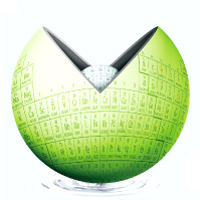
Published for geochemistry community from Geochemical Society of Japan.
Lipids in a sulfur-rich lacustrine sediment from the Nördlinger Ries (southern Germany) with a focus on free and bound sterols
Geochemical Journal, Vol. 47, No. 4, P. 397-407, 2013
ABSTRACT
The distribution of free sterols in a sulfur-rich lacustrine sediment of Miocene age deposited in the ancient crater lake of the Nördlinger Ries (southern Germany) was investigated and compared with the corresponding distributions of esterified and kerogen-bound sterols. The three fractions exhibited the same suite of principal sterols, with 4α,24-dimethyl-5α-cholestan-3β-ol, dinosterol and dinostanol displaying the highest concentrations and relative abundances. The distributions of sterols, steroidal ketones, n-alkanols and isoprenoid alcohols suggest a prevalent deposition of autochthonous aquatic organic matter under saline conditions. In particular, the high abundance of 4α,24-dimethyl-5α-cholestan-3-one, dinosterone and dinostanone and the corresponding 4-methyl sterols indicates the importance of dinoflagellate productivity in this former crater lake and its significant contribution to the sedimentary lipids in the Nördlinger Ries sediment. The similarity in structures and relative abundance of the major 4-methyl sterols and the corresponding steroidal ketones suggest that they are biosynthetically linked.KEYWORDS
Nördlinger Ries, lacustrine environment, core sediments, 4-methyl sterols, steroidal ketones, dinoflagellates- Published : 2013-08-20
- Released on J-STAGE : 2013/11/26
- Received : 2013/03/17
- Accepted : 2013/04/23
- DOI : https://doi.org/10.2343/geochemj.2.0258
- J-STAGE URL : https://www.jstage.jst.go.jp/article/geochemj/47/4/47_2.0258/_article/-char/ja
- J-Online ISSN: 1880-5973
- Print ISSN : 0016-7002
- ISSN-L : 0016-7002
All Issues
- Vol.59, 2025
- Vol.58, 2024
- Vol.57, 2023
- Vol.56, 2022
- Vol.55, 2021
- Vol.54, 2020
- Vol.53, 2019
- Vol.52, 2018
- Vol.51, 2017
- Vol.50, 2016
- Vol.49, 2015
- Vol.48, 2014
- Vol.47, 2013
- Vol.46, 2012
- Vol.45, 2011
- Vol.44, 2010
- Vol.43, 2009
- Vol.42, 2008
- Vol.41, 2007
- Vol.40, 2006
- Vol.39, 2005
- Vol.38, 2004
- Vol.37, 2003
- Vol.36, 2002
- Vol.35, 2001
- Vol.34, 2000
- Vol.33, 1999
- Vol.32, 1998
- Vol.31, 1997
- Vol.30, 1996
- Vol.29, 1995
- Vol.28, 1994
- Vol.27, 1993
- Vol.26, 1992
- Vol.25, 1991
- Vol.24, 1990
- Vol.23, 1989
- Vol.22, 1988
- Vol.21, 1987
- Vol.20, 1986
- Vol.19, 1985-1986
- Vol.18, 1984
- Vol.17, 1983
- Vol.16, 1982
- Vol.15, 1981
- Vol.14, 1980
- Vol.13, 1979
- Vol.12, 1978
- Vol.11, 1977
- Vol.10, 1976
- Vol.9, 1975
- Vol.8, 1974
- Vol.7, 1973
- Vol.6, 1972-1973
- Vol.5, 1971
- Vol.4, 1970-1971
- Vol.3, 1969-1970
- Vol.2, 1968
- Vol.1, 1966-1967
Current Issue:
Stats:
Impact Factor: 1.6 (2024)
Submission to final decision: 9.6 weeks (2022)




